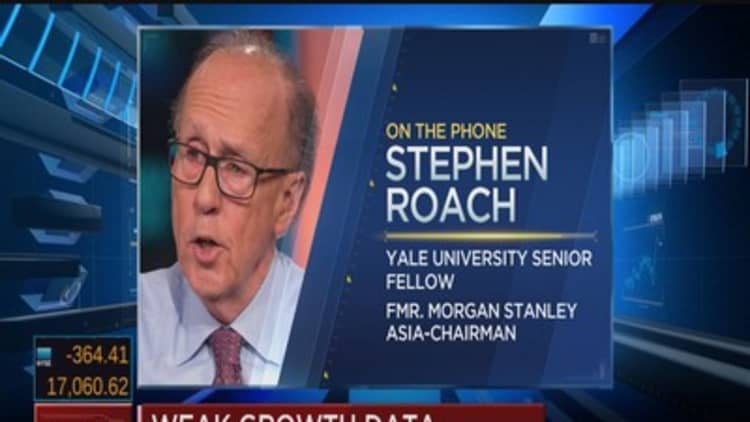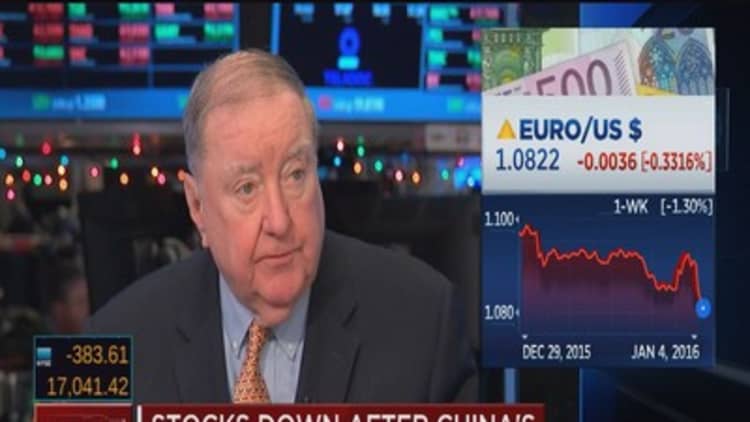
On a day that doesn't usually spell much for the annual market outlook, heightened concerns across the world — from China to the Middle East — created weakness in global markets.
The Dow Jones industrial average fell to levels unseen since the Great Depression on the first trading day of 2016 while the and Nasdaq had their worst first days of the year since 2001. The plunging Chinese markets also saw a sharp sell-off in stocks.
However, some experts said this downturn doesn't necessarily translate to disaster.
China sell-off
Despite lingering concerns that China could face a hard landing, former Morgan Stanley Asia chairman and Yale University fellow Stephen Roach said markets will end up being pleasantly surprised.
"I think the fears of a Chinese hard landing are vastly overblown," he told CNBC's "Squawk on the Street" on Monday.
Roach predicted that China's transitioning economy will continue to expand in the services sector.
"Structural change is glacial for any economy, even one that moves as quickly as China does," he said. "This fixation on China as an industrial production story is really outdated. The services sector is now 51 percent of the economy and climbing, much larger than the industrial and construction sectors. That's where the dynamism is."
Ed Yardeni, one of Wall Street's biggest bulls and president and chief investment strategist at Yardeni Research, agreed with Roach.
He told CNBC's "Fast Money: Halftime Report" on Monday that he didn't want to refer to China as a factor in the markets' downturn.
"I don't want to mention China because I just don't think the news out of there was all that earthshaking," he said. "We know that their purchasing managers manufacturing index has been below 50. If you look at the official number, what's interesting is there's an output component that's been consistently above 50 since 2009. It's been the employment component that's been dragging it down ... I'm not at all impressed by the apparent weakness in the PMI."
Dow falls, oil reacts to Middle East tensions

Meanwhile, some experts are worried that China's impact could instigate more turmoil in U.S. markets.
"It's highly unusual for day one to see a sell-off like this," UBS' director of NYSE floor operations, Art Cashin, told CNBC's "Squawk on the Street" on Monday. "Heaven forbid if we don't rally and we close right here, this would be the worst opening day of any year since 1932 for the Dow."
Cashin said in the last two trading days of 2015, investors were waiting on a Santa Claus rally that never came.
"We will have to put Santa's picture on a milk carton," he said. "It looks like he's been hijacked here somewhere."
Yardeni concurred that the market is angry at the absence of St. Nick.
"I think this is the humbug sell-off," he said. "We didn't get our Santa Claus rally so we're mad."
Cashin also said that he was "a little disappointed" that the oil reaction was muted.
"I would think with two major powers getting ready to go, at least verbally head to head, you would think that with a proxy war going on in Yemen, lobbing a few missiles into the Saudi Arabian oil facilities, so I'm kind of surprised that they didn't actually move oil a little bit stronger," he said.
Despite the ongoing geopolitical conflict, Yardeni said activity surrounding oil could be stimulative.
"People around the world are spending $2 trillion less on crude oil and that's got to be stimulative," he said. "Not only does it have to be stimulative, but you can actually see it in the data. Global oil demand is growing very rapidly. The problem is the supply, but that's not a problem. I mean, it is a problem for the oil producers, but I think it's going to be very stimulative."






